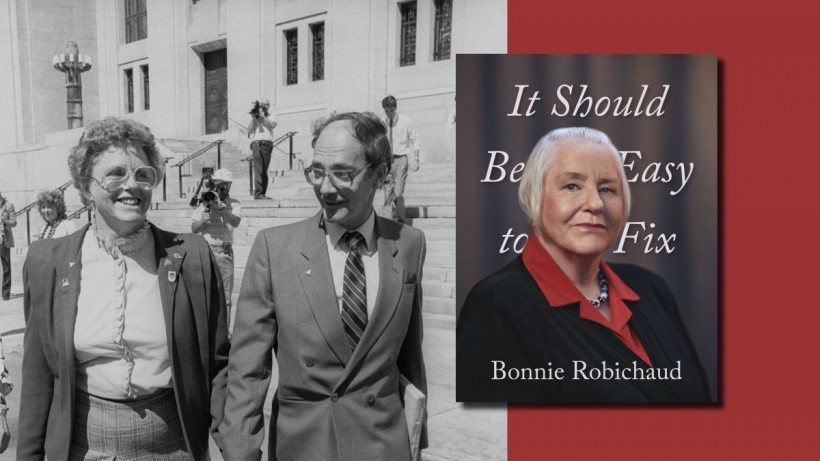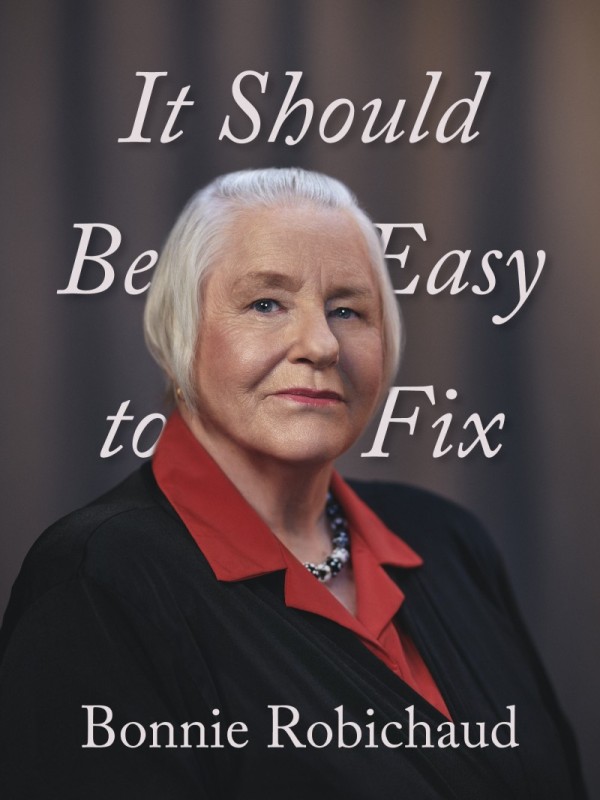The Last Win Is the Best Win

One year ago, on International Women’s Day, Between the Lines published It Should Be Easy to Fix, a moving memoir by Bonnie Robichaud about her eleven-year struggle against workplace sexual harassment. Robichaud’s fight eventually led to an unprecedented legal victory in the Supreme Court of Canada, making employers liable for sexual harassment as a form of discrimination in the workplace.
As a union activist who changed Canadian law, Bonnie Robichaud should be a household name in Canada, yet women’s struggles around sexual harassment remain undervalued in Canadian histories. That should be easy to fix! We’re kicking it off on IWD today by publishing the following excerpt from It Should Be Easy to Fix to celebrate this momentous win and honour women’s efforts in labour history.
Bonnie’s fight against sexual harassment at work was difficult enough, but we want to further acknowledge the many women who have historically faced additional challenges fighting back against workplace sexism, such as racialized women, trans women, those without migration status or job security, and women with disabilities or chronic illness. Their struggles are multiple and their victories momentous. Bonnie’s story is one woman’s experience, and there are many more.
This excerpt highlights Bonnie’s final fight at the Supreme Court, a last win for her and a victory for all women in Canada. During Bonnie’s long struggle with her employer, the Department of National Defence, she was offered as a settlement three years paid leave and tuition money to attend university. However, this offer had the condition that Bonnie abandon taking her case to the Supreme Court. Bonnie turned down the deal and continued to fight until the laws were changed for everyone. As we celebrate IWD 2023, it is our job to build solidarities across our experiences and to leave no one behind.
“It Should Be Easy to Fix”
My story at its beginning is similar to that of so many women in the workforce of the 1970s faced with being fired or having to quit because of sexual harassment.
I was married with five children, born only about a year or so apart, and was working at part-time, minimum-wage jobs, with hours that suited the employer and without protection. As a family, it was hard to make ends meet. With my income we were just about able to stay ahead of the bills.
When I finally found work as a unionized cleaner for the federal government at a Department of Defence military base, it felt really good. October 3, 1977, was the day I started working there. The position was complete with regular hours, benefits, sick days, and vacation pay. I knew it was a job I could do well. What I had not envisioned as part of the job was my boss’s constant mental and physical pressure to have a sexual relationship, not to mention the discrimination, simply for being a woman.
In 1979, faced with failing my six-month probation, being fired if I complained, or quitting, I decided it did not have to end that way. I was going to fight.
This book is written mostly about events in the 1980s, based on notes I took at the time and on my memory, often confirmed with the public record. Inevitably, though, at this distance in time, there will be inconsistencies, and any errors are my responsibility. It is a story of my eleven-year struggle, the exhilarating occasional ups and the long, desperate downs of fighting for my job and for my sexual harassment complaint to be heard. In 1979, I filed a formal complaint and, in 1987, took it all the way to the Supreme Court of Canada. I won the fight and changed the law.
When I started, I had no idea how widespread sexual harassment was in the workplace. When a high-ranking officer said I was the only one who had ever complained, I said, “Good, then it should be easy to fix.”
* * *
Supreme Court Victory
On January 6, 1987, Larry and I travelled to Ottawa for the preliminary hearing before the Supreme Court. Even though I was not allowed to attend, I wanted to be there. We travelled again to Ottawa for the May 6 hearing of the case. This time we were in the court. Seven Supreme Court judges were chosen to hear the case, including two women, Justice Bertha Wilson and Justice Claire L’Heureux-Dubé. K. Scott McLean and Michael L. Phelan represented me. We were another step closer to resolving my complaint.
After the hearing we waited, again. Waiting was something that happened a lot. Then we heard that the Supreme Court of Canada would make their ruling on July 29. Larry and I again went to Ottawa. We arrived the day before and stayed at a billet. It had taken such a long time to get to this point, and this was the last chance.
Finally, it was the big day. The ruling came down. The Supreme Court of Canada ruled unanimously, finding the employer—the Department of National Defence—vicariously liable for the discriminatory acts of an employee, known or otherwise.
Finally. A huge victory.
The ruling applied to all federally regulated workplaces. (Regulations governing provincially regulated workplaces would be pressured to catch up over time.) Justices Dickson, McIntyre, Lamer, Wilson, Le Dain, La Forest, and L’Heureux-Dubé were present, with Justice La Forest concluding with the disposition, “For these reasons I will allow the appeal, reverse the decision of the Federal Court of Appeal, and restore the decision of the Review Tribunal.”
Larry and I were present at the Supreme Court, on Wellington Street in Ottawa, when the verdict was read. I was thrilled to hear the Justice read the decision. I made sure I got a copy of the decision while I was in court and was given it without having to pay the five-dollar fee. When I asked for a copy, I was proud to say that I was the complainant in the decision, and the clerk was happy to give me a copy.
I felt like I was floating on air! A unanimous decision from all seven judges. We were all elated and we carried that spirit into the following press conference. It was such a tremendous relief. I was excited that I finally had received a decision that I could be proud of and that couldn’t be appealed. We had reached the highest court in Canada.
Dr. Marguerite Ritchie arranged a press conference, where she took the lead, explaining that an employer could no longer ignore sexual harassment at the workplace. When it came to my turn to speak, I said that there was nothing they could have given me, money or otherwise, that was more important than this decision. It was the best ever and I felt ten feet tall!
In the evening, Dr. Ritchie had a wonderful celebratory party at her home, where I met Lucie Laliberté who became instrumental in my representation at the Review Tribunal for damages just over a year later.
I was so excited by the decision that I wanted every student from grade 8 and up to receive a copy of it. I wanted everyone to know times were changing and, particularly, that women were gaining some rights when it came to a situation of sexual harassment at work.
The last win was the best win.

